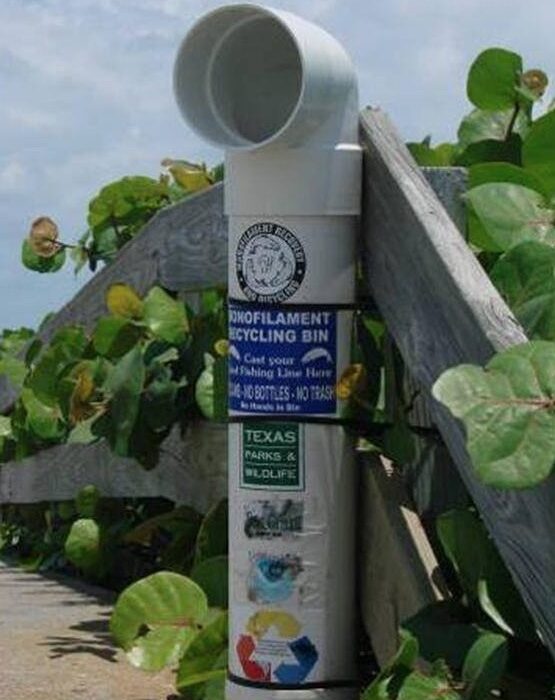
Volunteers collect fishing line from these monofilament collections bins which have been installed at piers in Port Aransas and Rockport.
Fishing piers in Port Aransas and Rockport now sport monofilament bins for the proper disposal of fishing line that can be deadly to marine wildlife. The bins are part of the Texas Monofilament Recovery and Recycling Program, a statewide campaign to heighten awareness of the negative impacts of fishing line debris.
Monofilament line is non-biodegradable and can last up to 600 years, even in the water. Throwing it in a garbage can is often not enough, say the experts at Texas A&M University, which administers the monofilament program. Line can blow out of the garbage and back into the environment, where it is a danger to wildlife.
Anglers are asked to be line conscious. Potato chip cans or tennis ball canisters can be used to dispose of line properly. Cut an X in top of the cans, then poke pieces of line through the lids. If throwing away in a garbage can, cut it into six-inch pieces, experts recommend.
Also, if a line gets tangled while fishing, anglers should take the time to remove it from the environment. Monofilament tangled in utility lines must be handled by the utility companies. In 2014, monofilament removal cost $10,000 and disrupted boat traffic in several bays and inlets. The line was removed after several birds were fatally trapped at different locations.
Volunteers are needed to sponsor outdoor monofilament recycling bins and to participate in local beach and river cleanup events. Volunteers clean out public monofilament bins, sending the line the Berkley Conservation Institute, the only place that recycles used fishing line.
Since 1990, Berkley has recycled more than 9 million miles of fishing line: enough to fill two reels for every angler in America. Line ready for recycling can be sent directly to the collection center at: Berkley Recycling, 1900 18th Street, Spirit Lake, Iowa 51360.
Berkley respools line and used it to build fish habitats that can be installed under piers and fishing docks. The artificial, underwater structures encourage plant growth, providing natural cover essential to the growth of a healthy fish population.
To participate, email j-oconnell@tamu.edu or call the Texas Sea Grant College Program at 979-845-3854.





